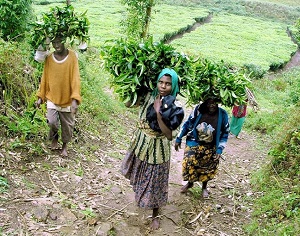Image: Rwandan tea pickers carry their load of leaves for weighing near the northern Rwandan town of Mulindi on March 16, 2004. REUTERS/Finbarr O’Reilly/Files
![]()
By Chris Arsenault
TORONTO (Thomson Reuters Foundation) – Women in more than 90 countries still lack equal rights to own land, hurting food production and efforts to tackle poverty, Rwanda’s former agriculture minister said.
Nations in eastern and southern Africa have considerably improved their laws to grant land ownership rights to female farmers, Agnes Kalibata said.
But many states in North Africa and South Asia continue to treat women as second class citizens when it comes to land ownership, she said.
“In Africa, six out of 10 women depend on the land for their livelihoods,” Kalibata told the Thomson Reuters Foundation ahead of International Women’s Day on Tuesday.
“They must have access to the means of production – the land itself. If we are going to have development across the globe, women need equal access to the land.”
Up to 30 percent of women have land access in eastern and southern Africa, compared to less than 10 percent in northern and central Africa, she said.
Without formal land titles, women have a harder time feeding and educating their children.
Agricultural productivity also suffers as female farmers are less likely to invest in improving the land without formal ownership, making it harder to feed the 795 million hungry people worldwide.
During her tenure as Rwanda’s agriculture minister which ended in 2014, Kalibata helped enact legal changes that give a woman ownership of half the land her family owns. In many other developing countries, land titles are kept in the husband’s name.
She also made it easier for widows to inherit family plots when their husbands died.
“Incredible things are going on in Rwanda when it comes to women’s land rights,” said Rena Singer, spokeswoman for the Washington-based rights group Landesa.
“If women can’t inherit land, we see the continuation of inequality between genders. The only way most poor people get resources in their lifetime is to inherit – they don’t have the money to purchase land.”
Even in countries like Rwanda with good land laws, lax enforcement and patriarchal customs can make it harder for female farmers to control their incomes, Kalibata said.
Governments need to invest in education, so rural women understand they have the right to own valuable land assets, she said, as many remain unaware of new laws granting them access.
Data on women’s land ownership is limited, but statistics from the U.N. Food and Agriculture Organization indicate women control less than a quarter of agricultural land holdings in developing countries.
(Reporting by Chris Arsenault, editing by Alisa Tang. Please credit the Thomson Reuters Foundation, the charitable arm of Thomson Reuters, that covers humanitarian news, women’s rights, trafficking, and climate change. Visit http://news.trust.org/)
Copyright 2015 Thomson Reuters. Click for Restrictions.
Female-farmers-in-90-nations-face-discriminatory-land-laws-media.jpg


